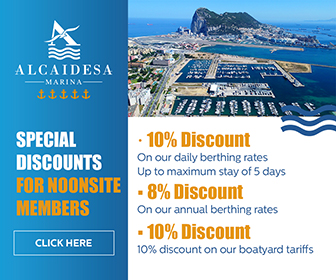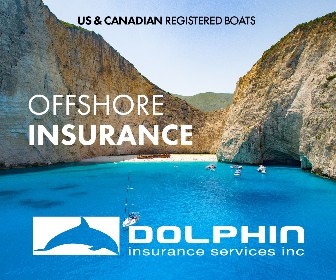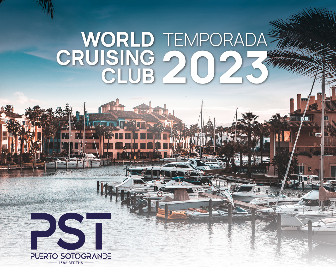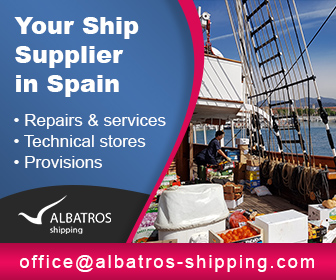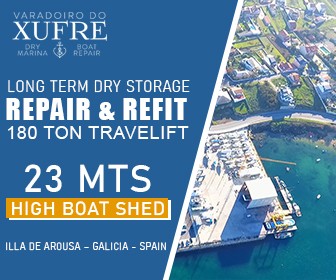Mediterranean: The Migrant Crisis – Tragedy and Treachery
As Guy Taylor and his wife Rhonda neared the end of their time sailing in the Western Med, they encountered the harsh reality of the plight of desperate migrants trying to cross from Africa to Europe. Here Guy reports on their experience off Southern Spain and offers some timely advice.
Published 3 years ago

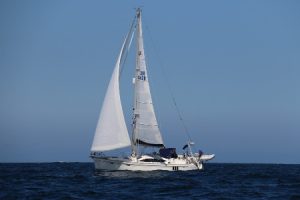
- Saving Grace II at sea off Portugal.
Listening to Ch16 towards the Strait of Gibraltar, the constant reports of barely inflatable craft carrying migrants provides an unsettling soundtrack to the spectacle of the Pillars of Hercules. As we neared the end of our time in the Western Med, the harsh reality of the plight of these desperate people was brought into sharp focus.
After an early departure from Marina Del Este on Saving Grace II, our Southerly 42RST, we were bound for Gibraltar, a passage of around 90NM. My trusty first mate and wife Rhonda, and our good friend and very experienced crew Taffy Thomas made up a robust team.
Not long before the equinox, the nautical twilight before dawn provided a good coastal view. The wind was virtually non-existent, but the lumpy sea offered a clue to the Levant blowing further south in the Alboran Sea.
Something Odd off the Port Bow
Once daylight had revealed startlingly blue Mediterranean skies, a change of watch permitted a few zeds in the cradle of Saving Grace’s hypnotic rhythm. Some say you can anticipate changes in conditions simply through sensing the sound and motion of a yacht’s progress, well documented by Tristan Gooley in “How to Read Water”, but for me an otherwise peaceful interlude was rightfully interrupted by Rhonda spotting something odd off the port bow.
Around 15NM to the south of Malaga we came upon a large abandoned RIB, complete with 3 huge outboard engines, but empty of life with the occupants’ apparent attempts to either scuttle the craft or perhaps damage caused by a collision or adversaries.
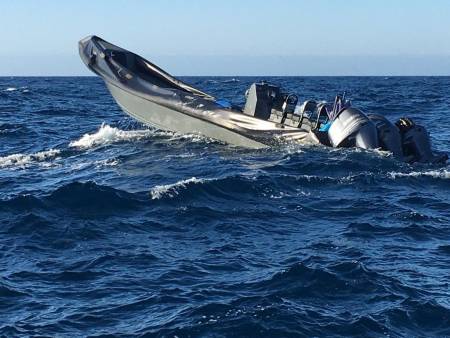

We changed course to take a closer look by which point adrenalin heightened anticipation of what we may find. Earlier coast guard alerts describing a missing vessel the previous day were fresh in our minds, but surely that had been resolved?
Initially we passed within about 30 metres of the RIB, close enough to get a clear view about what might be left on board, but an adequate distance to stand off should the circumstances require. Visible sealed containers suggested a potentially valuable cargo, something which could have featured in the BBC’s Costa del Narcos documentary, adding to our sense of trepidation.
Reporting to the Authorities
After closer inspection and not seeing any individuals in the boat or close to it, we reported the sighting to the coastguard who immediately patched us through to Tarifa MRCC. After several VHF exchanges informing the position of the abandoned craft and our own details, we forwarded images via WhatsApp, which seems a preferred mode of communication. Apart from a few polite expressions of thanks and an All Ships Sécurité, no immediate action appeared to be taken to explore for its former occupants or recover the vessel.
Human Tragedy or Drug Running Treachery?
So the big question remained in our minds; was this the result of a human tragedy or the treachery of drug runners?
Subsequent research points to a combination of both; it is estimated that thousands of migrants pay upwards of 4,000 Euros each to ruthless traffickers for a fast, 70kt RIB between Morocco and Spain, but sadly the number that don’t make is equally shocking. In 2017 alone 2,687 were lost, more than 7 fatalities a day across sea lanes used by 120,000 ships each year. The well-organised criminal gangs parallel enterprise feeds the European appetite for cocaine and provides a distribution channel for 700,000kg of Moroccan hashish.
Doing our Duty
As our journey continued into Gibraltar and, after stopping for victuals (and diesel at 47p a litre), we sailed on through the Strait. In true Trafalgar tradition, I believe we did our duty and on a brighter note, we exited successfully – avoiding the Orcas – and ticked off a bucket list aspiration flying a spinnaker just past Tarifa.
Key Learnings
Some of these learnings may appear a bit “skipper 1.01” but the warm and mostly non-tidal conditions in the Med can lull you into a false sense of infallibility.
- A well calibrated compass offers guidance on your direction of travel, but not the moral dilemma of choices that may impact upon the wellbeing of crew or those in peril. The grim reality of the drugs and human trade between Africa and Europe certainly makes you reflect on some of bigger issues yachtsmen confront. Refining your decision making skills and how you engage with your crew is, in the view of the author, central to successfully dealing with challenges whilst on board.
- Remember and revise your RYA VHF course: In the UK sailors have the gift of communicating with well trained respondents practiced in the skill of listening and eliciting important facts. Whilst this is mostly true around Europe, speaking clearly and providing precise details (yacht name/position/MMSI, number on board, nature of issue etc) to those whose first language is not English, is really worth bearing in mind. So be patient.
- Discuss scenarios with your crew: But be clear that respecting their opinions doesn’t disintegrate into the vagaries of management by committee. Ultimately it’s the Skipper’s call, she or he has responsibility for the safety of the crew once it’s made. Be clear on what the scenarios are and have plans in place to deal with them.
Guy and Rhonda Taylor
SV Saving Grace II
…………………………………………………………………………………………………………………………………..
About the Authors:

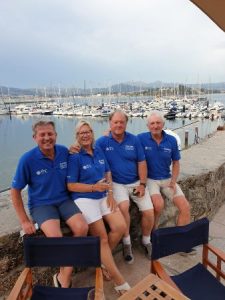
- Guy and Rhonda with crew.
Guy Taylor learned to sail in Chichester harbour in the 1960s. After sailing dinghies and catamarans, larger yachts figured. Residents of Dubai for the past 30 years, Guy and his wife Rhonda have spent many wonderful holidays on Saving Grace II, their second Southerly built by Northshore in Itchenor, cruising the Channel, France, Spain, Portugal and the Balearics.
Last year’s COVID-19 lockdown together with speculation about VAT issues, prompted their decision to return the boat to the UK. After over-wintering in Lagos, Portugal, they made the boat ready in April and May and set sail north in June 2021. They have just arrived back in the UK (see their report on the homecoming).
…………………………………………………………………………………………………………………………………..
Related Links:
- UK: Sharp Increase in Migrants Crossing the Channel in Small Boats
- UK to pay £55M to French Border Patrols to fund Migrant Clampdown (The Guardian)
- Migrants at Sea: The Dos and Donts of Helping those in Distress (Yachting Monthly)
- English Channel: Record Number of Migrants Rescued from Small Rubber Boats (Noonsite – Feb 2020)
- Other Migrant reports on Noonsite
…………………………………………………………………………………………………………………………………..
The opinions expressed in this article are the author’s own and do not reflect the view of Noonsite.com or World Cruising Club.
Related to the following Cruising Resources: Atlantic Ocean East, Incident Reports, Mediterranean, Routing, Safety, Safety and Medical

